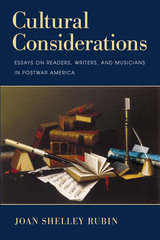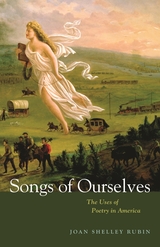
Focusing on aspects of American literary and musical culture in the decades after World War II, Rubin examines the contests between critics and their readers over the authority to make aesthetic judgments; the effort of academics to extend the university outward by bringing the humanities to a wide public; the politics of setting poetic texts to music; the role of ideology in the practice of commissioning and performing choral works; and the uses of reading in the service of both individualism and community. Specific topics include the 1957 attack by the critic John Ciardi on the poetry of Anne Morrow Lindbergh in the Saturday Review; the radio broadcasts of the classicist Gilbert Highet; Dwight Macdonald's vitriolic depiction of the novelist James Gould Cozzens as a pernicious middlebrow; the composition and reception of Howard Hanson's "Song of Democracy"; the varied career of musician Gunther Schuller; the liberal humanism of America's foremost twentieth-century choral conductor, Robert Shaw; and the place of books in the student and women's movements of the 1960s.
What unites these essays is the author's ongoing concern with cultural boundaries, mediation, and ideology--and the contradictions they frequently entail.

Listen to a short interview with Joan Shelley RubinHost: Chris Gondek | Producer: Heron & Crane
In the years between 1880 and 1950, Americans recited poetry at family gatherings, school assemblies, church services, camp outings, and civic affairs. As they did so, they invested poems--and the figure of the poet--with the beliefs, values, and emotions that they experienced in those settings.
Reciting a poem together with others joined the individual to the community in a special and memorable way. In a strikingly original and rich portrait of the uses of verse in America, Joan Shelley Rubin shows how the sites and practices of reciting poetry influenced readers' lives and helped them to find meaning in a poet's words.
Emphasizing the cultural circumstances that influenced the production and reception of poets and poetry in this country, Rubin recovers the experiences of ordinary people reading poems in public places. We see the recent immigrant seeking acceptance, the schoolchild eager to be integrated into the class, the mourner sharing grief at a funeral, the grandparent trying to bridge the generation gap--all instances of readers remaking texts to meet social and personal needs. Preserving the moral, romantic, and sentimental legacies of the nineteenth century, the act of reading poems offered cultural continuity, spiritual comfort, and pleasure.
Songs of Ourselves is a unique history of literary texts as lived experience. By blurring the boundaries between "high" and "popular" poetry as well as between modern and traditional, it creates a fuller, more democratic way of studying our poetic language and ourselves.
READERS
Browse our collection.
PUBLISHERS
See BiblioVault's publisher services.
STUDENT SERVICES
Files for college accessibility offices.
UChicago Accessibility Resources
home | accessibility | search | about | contact us
BiblioVault ® 2001 - 2024
The University of Chicago Press









